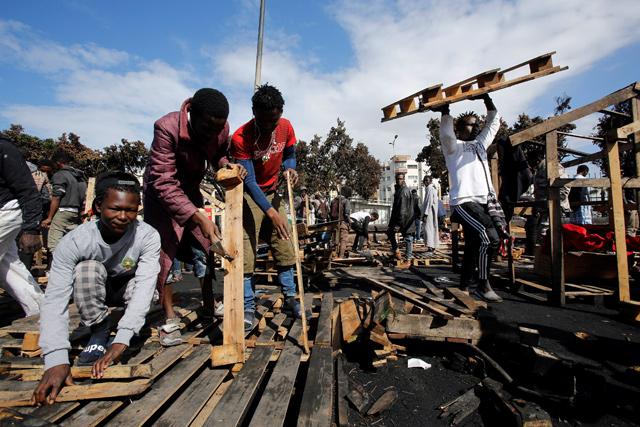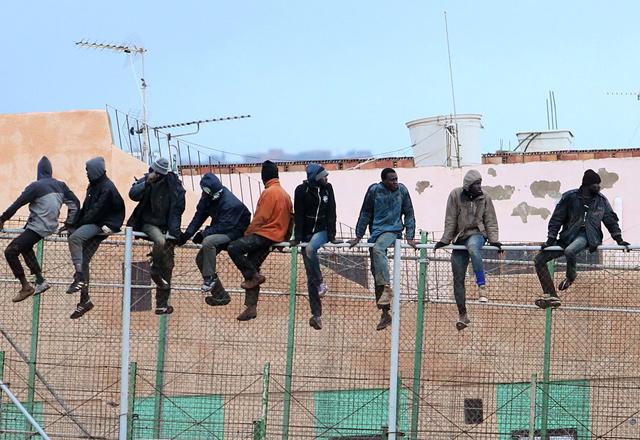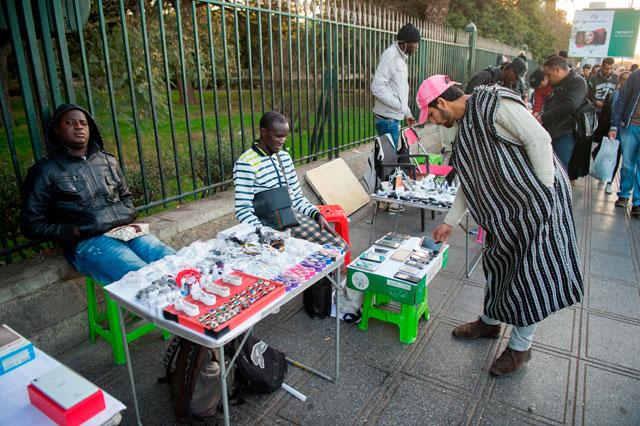You are here
Morocco warns EU about ‘fortress’ mentality
By AFP - Nov 01,2018 - Last updated at Nov 01,2018

African migrants build a makeshift house after their houses burned, on the outskirts of Casablanca, Morocco, on Monday (Reuters photo)
PARIS — Morocco's foreign minister has warned Europe against developing a "fortress" mentality to immigration from Africa, while promising his country is doing everything possible to control its borders.
Morocco, which nationals of many African states can visit without visas, has become a major gateway for sub-Saharan migrants into Europe, with 47,000 entering Spain from the north African coast in 2018, four times the number for the whole of last year.
The main reason is changes to smuggling routes favoured by human traffickers, who have switched their operations progressively from Turkey or Libya to Morocco over the last three years.
In an interview with AFP, Foreign Minister Nasser Bourita urged European politicians not to stoke fears about immigration and understand the problems of the poor countries where many migrants originate, as well as transit nations like Morocco.
"For as long as Europe chooses a security approach, that will favour illegal migration. If Europe turns itself into a fortress, there will be new ways of getting round the controls," he said late on Wednesday.
The EU has put forward a migration strategy that includes increased development aid to tackle poverty in Africa, but anti-immigration, far-right politicians promising to seal borders are gaining ground continent-wide.
Italy's new populist government, which includes figures from the far-right League Party, has taken the lead in promising mass expulsions and a new hardline on arrivals.
"There's no longer a cool-headed discussion to find solutions. People try to exploit the issue for gains elsewhere," Bourita said in a telephone interview.
Under pressure
Morocco has found itself under increasing pressure from its European partners, particularly Spain, to help stem the number of migrants crossing into Spanish enclaves in north Africa or crossing the Mediterranean. It has also faced criticism for either doing too little to crack down on human traffickers, or for the methods used to move sub-Saharan Africans away from its northern coast.
"All the pressure shouldn't be on transit countries, that European countries say from their own comfortable positions 'you are mistreating migrants' or 'you are too slack, it's a problem'," Bourita said. "Everyone has a responsibility."
The European Union agreed to an extra $62 million in funding for Moroccan and Tunisia border controls in August, while further aid is reportedly under discussion.
Some analysts believe the kingdom is using its leverage with Europe behind closed doors.
This could see it demand more money for security and economic development, or by using the issue in other diplomatic negotiations such as over the status of the disputed Western Sahara region, or fishing and agricultural deals with the EU.
Increased arrivals from Morocco "may have been part of a Moroccan strategy to heighten the EU's awareness of its importance as a migration partner, with a similar aim of potentially increasing financial aid", analyst Chloe Teevan at the European Council on Foreign Relations wrote last month.
Turkish President Recep Tayyip Erdogan has openly used this strategy, warning Europe repeatedly that he would open the gates and allow millions of refugees and migrants to start crossing the Mediterranean again.
The EU signed a controversial — but effective — deal with Turkey in 2016 tied to aid of 3 billion euros to stop the flow of migrants. It has also negotiated with Libya and Egypt, other countries with poor human rights records, with the same goal.
Bourita denied that Morocco was asking for anything in return for its cooperation with the EU, saying it was acting in its own national interest and to show goodwill towards its European partners.
"There is an offer from Europe to help us in our efforts and Morocco has taken note of this, but Morocco is not there to negotiate anything," he said, declining to talk about the amount of additional aid being discussed.
Moroccan authorities say 54,000 attempts by migrants to cross to Europe were foiled between January and the end of August.
"Things are going in the right direction," he said. "There are real results."
Related Articles
MADRID — Spain sent 55 migrants back to Morocco on Monday a day after they forced their way into the Spanish territory of Melilla during an
RABAT — Morocco on Friday rejected a resolution by the European Parliament which accused Rabat of using migrants to apply "political pressur
RABAT — Unable to reach Europe in search of a better life, Aliou Ndiaye settled in Morocco instead, giving up on his original goal like thou


















